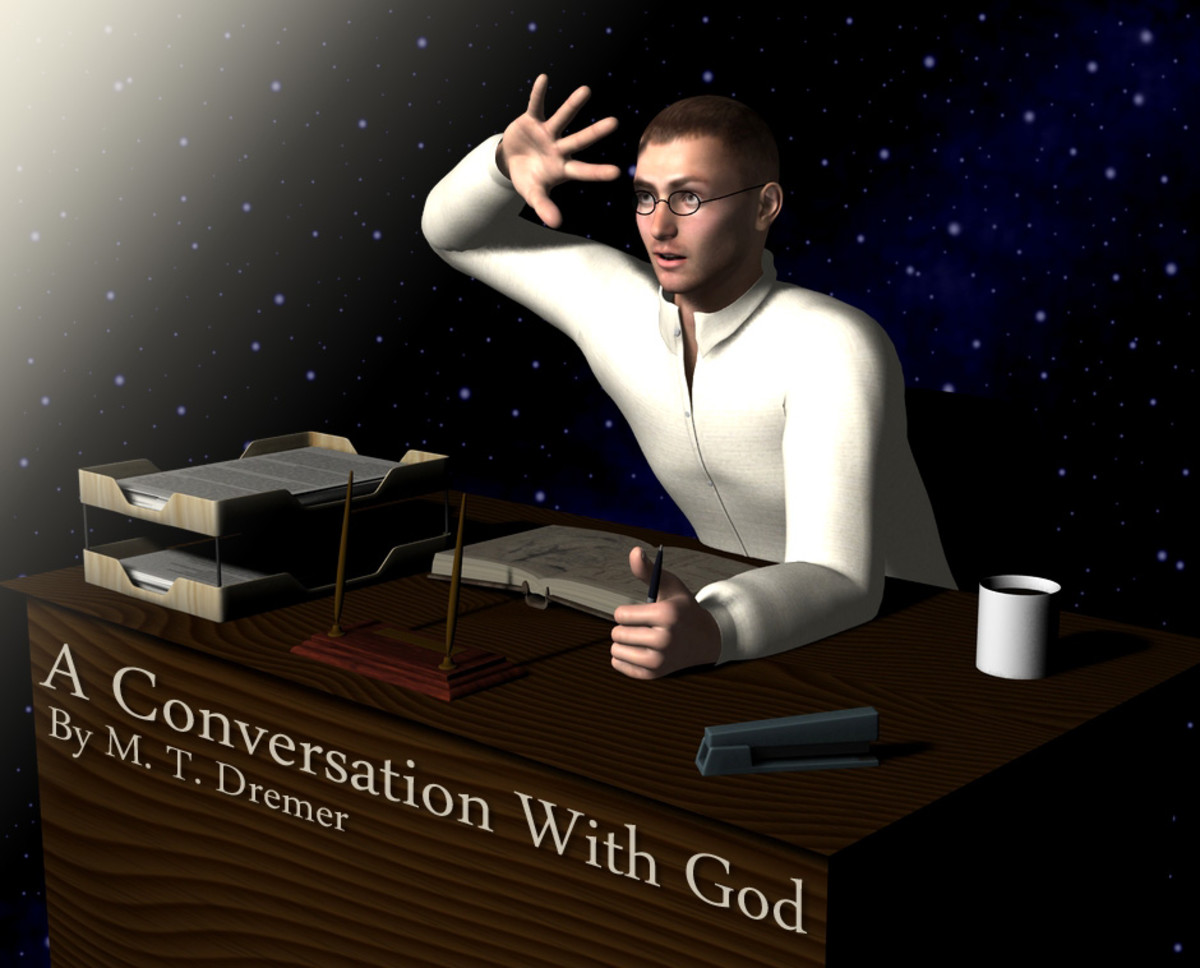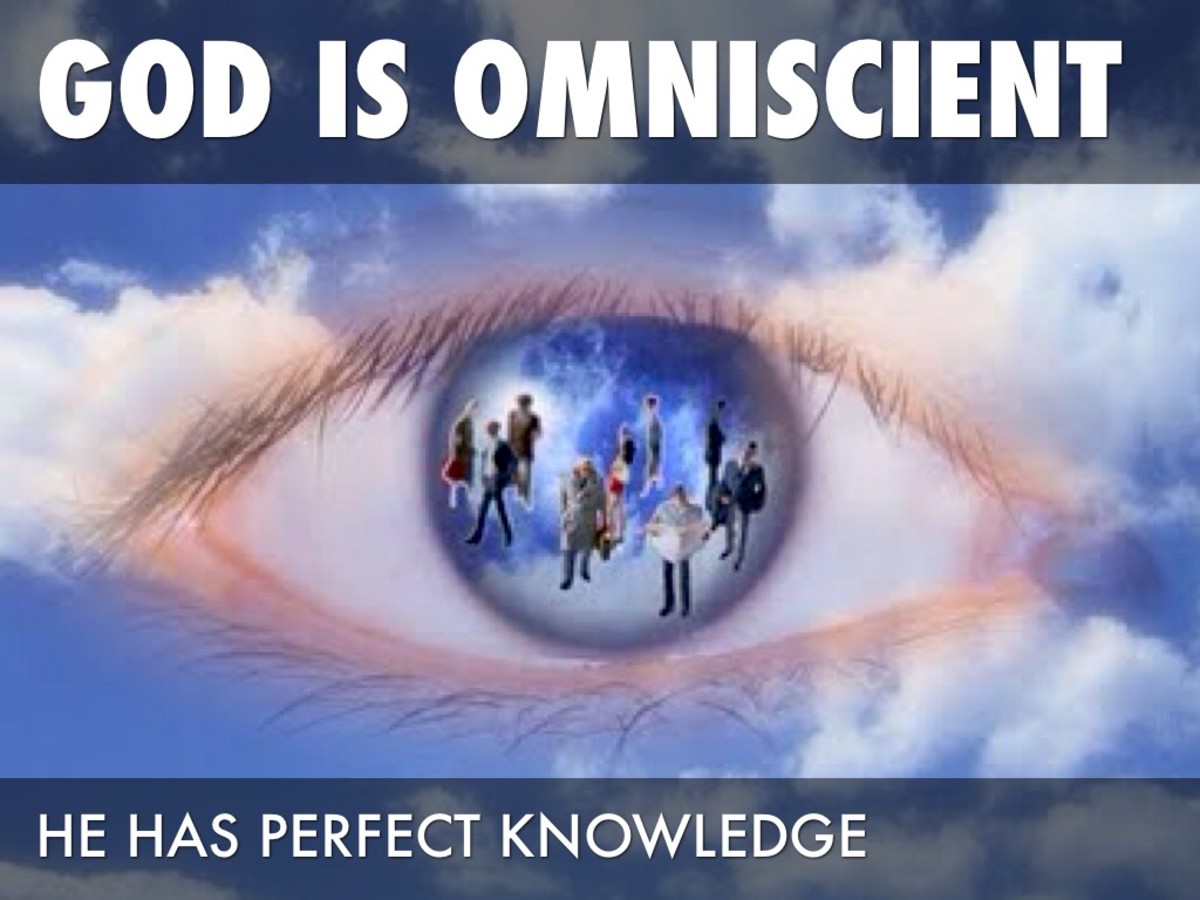If God is All-Knowing or Omniscient, Do We Really Have Free Will?

Introduction
My question on HubPages about whether an all-knowing God and free will are incompatible concepts elicited interesting responses. Our free will is central to who we are and come hell or high water, most of us will choose our free will over most other things. In fact, a question asked by Chesterton Wilde about whether anyone would choose a peaceful and beautiful Earth over free will drew 11 responses to date, of which only one answer was in the affirmative.
The concept of free will along with a God who knows everything is rather tricky. I’m going to explore into this and if I can, I will include snippets from some of the hubbers who commented. And I would like to thank all who commented as you gave me the inspiration and ideas to write this hub.
This hub is divided into 3 sections, with each section looking into a different possibility. I have tried to keep things as non technical as possible but when we go into subjects in which there is no real agreement, you can expect the old grey matter to get a little exercise.
God Knows All, We Have Absolutely No Free Will
Perhaps a short video would serve to illustrate the concept of determinism which, in our case, is the idea that everything is 100% predictable including living beings with free will such as us. The first half of the video is a little draggy but it gets into the heart of the message in the second half of the video.
God's Flaw
The gist of the video is that if the starting conditions are exactly the same, the end result would be exactly the same every single time. If you toss a coin onto the floor, it would be quite impossible to know where on the floor it would end up. If you can replicate the starting conditions exactly and toss the coin a second time, the coin would end up in exactly the same spot on the floor.
The same will happen for human beings who have the perception of free will. If you were to receive a marriage proposal, your answer would be based on numerous factors. If it was possible to replay exactly all the events leading up to the first marriage proposal, a second proposal would elicit exactly the same answer as the first. However many times this is done, so long as the events leading up to the proposal is exactly the same, your answer would be exactly the same.
In other words, the future has already been written. Based on what happened in the past, in fact, based on the starting conditions of our universe at the very beginning of time, your future and the future of every living thing on this planet up to the end of time has already been written. We are powerless to change not even a single tiny detail.
I may have deviated a little from the concept of an all-knowing God but the ramifications are similar. As iantoPF puts it, God “is literally yesterday, today and tomorrow... (and) … knows what we have done.” (caps removed), implying that while our future has not yet happened, God has already seen what will happen and what choice we will make. I believe what he was trying to say was that we have complete free will in that God does not control our actions, but because God is all-knowing, he already knows the choices that we will make.
The same general view was echoed by krillco when he talks about a parent knowing “a child so well that they can predict what the child will do in a particular situation.” or by Sheepsquatch when he talks about handing you a hot pan and knowing “that you will let go of the pan after I hand it to you.” They state that knowing the outcome does not mean that they control the outcome implying that God knows all but does not control and thus you have complete free will over your decisions.
The view that God is all-knowing in that he knows exactly what will happen but since he does not influence or control the events, we still maintain absolute control and free will has been repeated many times emphasizing God’s lack of interference and hence our freedom to choose.
God’s foreknowledge of events to come or God’s lack of interference or control is also not at issue. God is not really the issue but what is really at issue is the predictability of events to come.
If God is all-knowing and he knows the future with 100% certainty, then the future has already been written. From another perspective, if we are the sum total of all our experiences, we are also not in control of our destiny but simply following a path laid down at the very beginning of our universe.
God Knows All Possible Outcomes But Not the Actual Outcome Until it Happens
Both the deterministic and the all-knowing God view of free will is rather depressing as it gives us absolutely no free will following a path that has already been set in stone many, many millennia ago. The good news is that in this view we are completely absolved of all our failings and transgressions but comparatively recent discoveries in the nature of our world have introduced a certain fuzziness into the deterministic view.
I am talking about quantum physics. Many of the phenomenon observed in the quantum world is totally inconsistent with our everyday experience of the world. The video below describes the double slit experiment and its results.
Dr Quantum - Double Slit Experiment
I hope the video wasn’t too challenging as quantum concepts tend to be rather difficult to grasp. A possible interpretation of this experiment is that the electron exists in all its possible locations, collapsing into one location only when observed. In other words, if we were to fire an electron and measure its location and if we were able to somehow fire a second electron, the position of the second electron would be different from the first. If we were to try this multiple times, the position of the electron each and every time would be different.
However, all the measurements of the electron’s positions would be in the same general area. So, while it is impossible to determine the location of the electron before measurement, it is possible to approximate the location of the electron.
With the discoveries in quantum physics, our previous deterministic universe has acquired a slight fuzziness. It is important to note that this fuzziness is a characteristic of our universe and does not relate to the imperfections in our instruments. Even if we were able to design the perfect instrument, the fuzziness would remain.
Nobody can tell how the phenomenon observed at the quantum level affects our free will. I would speculate that it would give us a measure of free will, so that our choices, while still largely foregone conclusions, do occasionally deviate from the expected.
For example, let’s replay our marriage proposal from the deterministic universe in our slightly fuzzy universe. Let’s say that he is a pretty nice guy and that you are in two minds on what answer to give your love-struck Romeo. In such a case, if we were able to rerun his marriage proposal multiple times, it might just be possible that your answer would not be the same each time which, I believe, is what our concept of free will is.
In such a universe, even an all-knowing God would not know the eventual outcome. As mintinfo puts it, “We have free will because God is only all knowing based on the amount of possibilities that exist.” God would know all the possible outcomes and even the most probable outcome but as to what is the eventual outcome, he would just have to wait for events to unfold just like the rest of us. We can reconcile the concept of an all-knowing God with this lack of foreknowledge on his part to the argument that he knows all that is possible to be known but he does not have foreknowledge of the eventual outcome because it is unknowable. The laws of our universe are such that the outcome is unknowable.
We Really Don’t Know Anything at All
SidKemp echoes the subject of this section very well when he said, “... we cannot answer this question from our current perspective, living inside time as we do.” We live in a world with three spatial and one time dimension. While we can move freely in the three spatial dimensions, we can only move at a fixed speed and in only one direction in the time dimension. What if it is possible to move through time as easily as we move through space?
Premonitions might not be actually moving forward in time, but it is having access or knowledge of a future event. Many studies have suggested that the human brain has the ability to look into the future. An example of such a study would be one done by Dr Dean Radin. He hooked up volunteers to a modified lie detector which would detect changes in electric current across the surface of the skin. He showed them sexually explicit, violent or soothing images in a random sequence and monitored the changes in electric current at the same time. Time and again the volunteers reacted a few seconds before they were shown the images, way more often than chance would allow.1
It is also possible that premonitions are more commonplace than suspected and that we may be constantly accessing the future and actually adjusting our actions from what we see. Studies involving trains and planes that were destined to crash seem to indicate that they were more empty than they usually would be. As an example, all four of the hijacked planes on 9/11 were carrying only half of their usual complement of passengers.1
The evidence for premonition is by no means exhaustive but it is starting to become clear that there is something unexplained at work. If the phenomenon at work here is actually premonition, in that what happened or is going to happen in the future is affecting us in the present, can we take it one step further and see if the present can affect the past?
The notion that what we do in the present can affect the past probably goes against everything that you know but this notion has a name called retrocausality or retro-causation. And experiments conducted to test for retrocausality has not come up empty.
In a study done by Dr. Daryl Bem, a social psychologist at Cornell University, college students were asked to read a list of words and then were given a surprise test to see how many words they remembered. A computer then randomly selected a few words on the list and the students were asked to retype the words a few times. Surprising, the students were better at recalling the words that they were asked to practise after the test.2
The main purpose of this section is to highlight that while our science and technology has advanced by leaps and bounds, we are probably still woefully ignorant of the true nature of the world that we live in. Premonitions and retrocausality are just two of the many unexplained and unknown phenomenon which, if proven, might completely change our understanding of the world. And, to be sure, what we know and understand of our own free will, would also change.
I think a fitting end to this hub would be a video recommended by ptosis. It talks about our three dimensions, and then introduces the fourth or time dimension, and travel forward and backward in time. It then goes on about what it might be like if there were more dimensions after the fourth.








